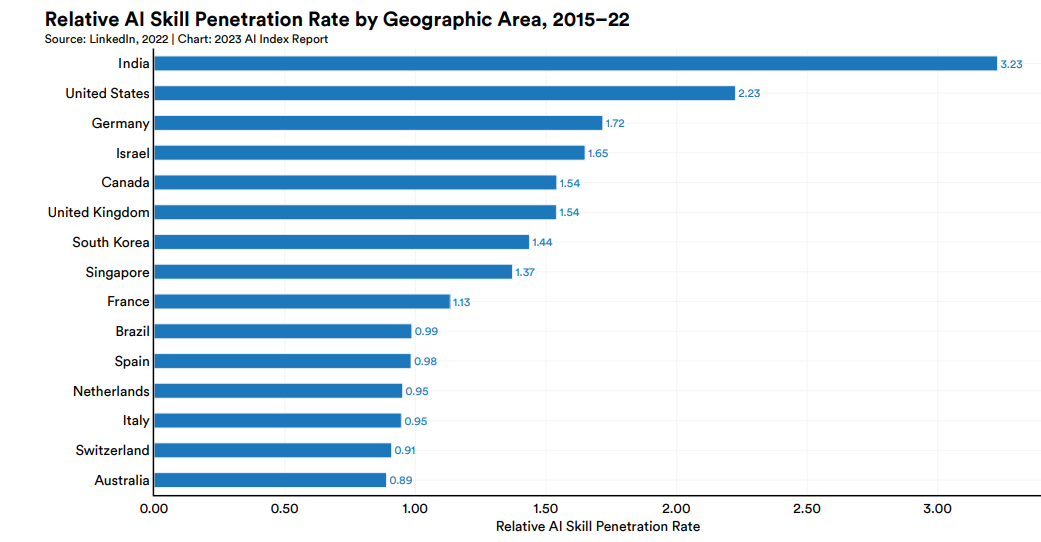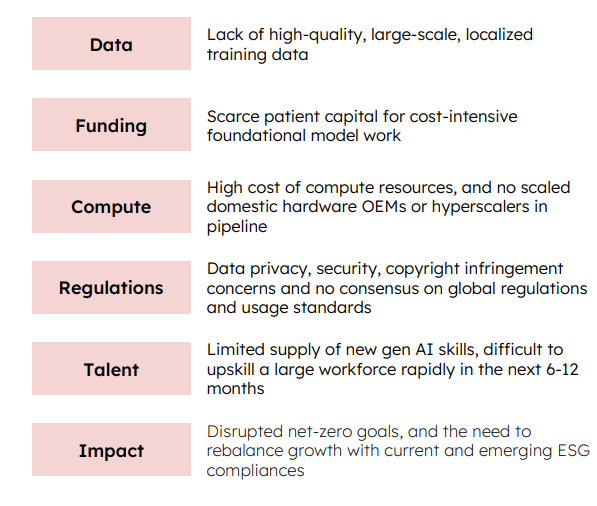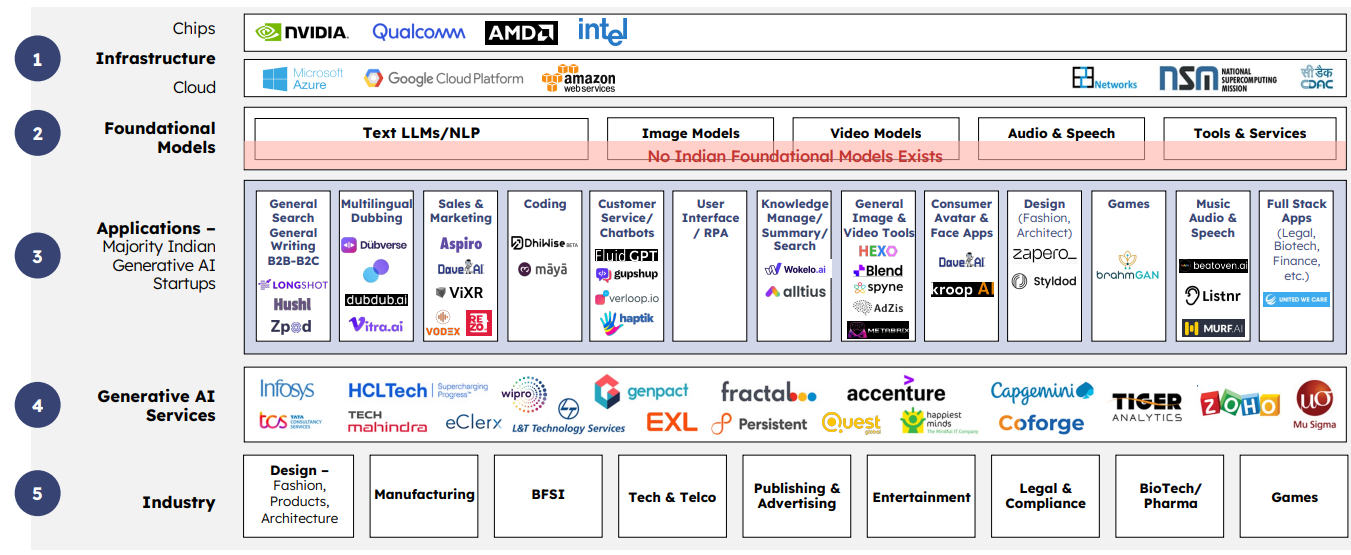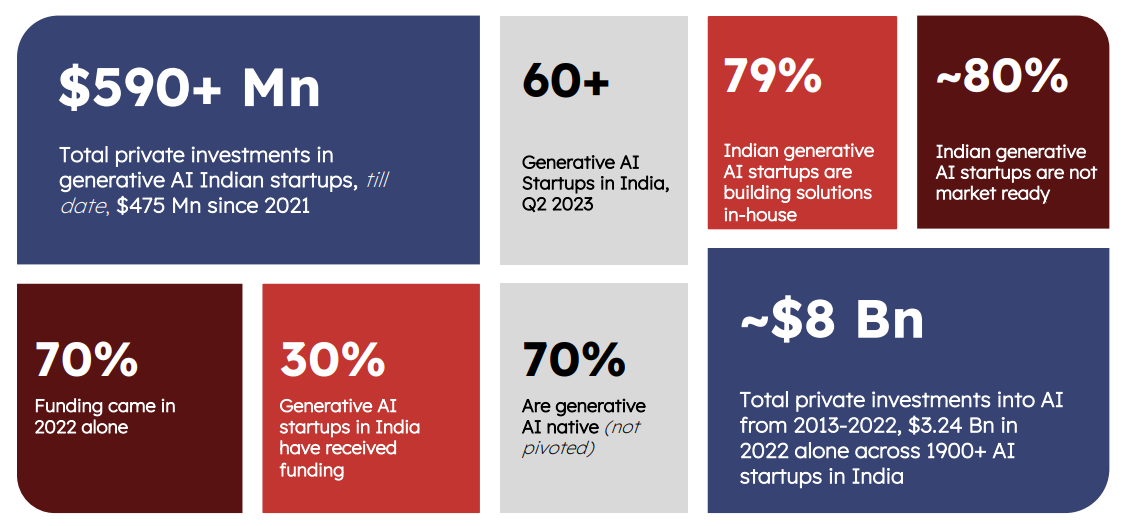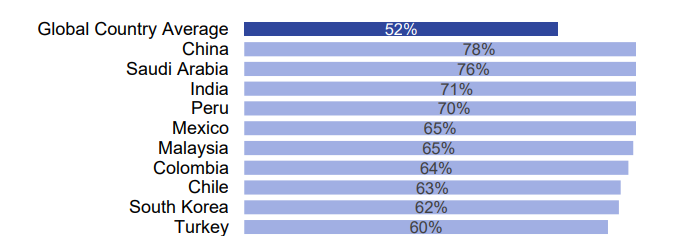Project Management
Generative AI In India: A Growing Technological Frontier
- DaveAI
- October 6, 2023

Generative AI is more ingrained within the Indian ecosystem than you’d think—with 73% of Indians using generative AI. And why not? This technology is a subset of artificial intelligence that can create new text, images, music, and more.
Let’s deep-dive a little to understand the opportunities and challenges Generative AI technology poses for the Indian technological landscape.
The Rise of Generative AI in India’s Tech Landscape
The growth of Generative AI in India is unparalleled. According to NASSCOM, Indian startups in Generative AI have been doubling since 2021 and have received a staggering $475 Mn funding in the last 2 years. IDC also claims that India’s expenditure on AI will reach $3.6 billion by 2026, at a CAGR of 34.3%
The real question is: What’s fueling this momentum?
Here are a few possible factors:
- OpenAI: Microsoft invested $1 Bn in OpenAI in 2019. This provided the much-needed boost to commercialize generative GPT models. Consequently, investments grew 3X between 2019-2022.
- Sparked interest: From startups to large-scale businesses, everyone wants a piece of AI to address a specific business use case or to drive productivity.
- Development of generative adversarial networks (GANs) since 2010: A type of deep learning model that was developed in 2010, this technology is what makes it possible for AI to generate realistic content, images, videos, and more.
Transforming Industries with Generative AI
Applications of Generative AI technology in India are second to none. Industries across the board are leveraging this technology to offer new innovative products, improve existing offerings, or automate productivity-leaking tasks:
- Healthcare: In healthcare, Generative AI can be used to personalize treatment plans and accelerate drug discovery. In fact, the market for Artificial Intelligence (AI) platforms for healthcare in India is set to grow to $4.3 billion by 2024.
- Finance and Banking: Finance and Banking can benefit from generative AI by predicting market trends, studying customer behavior to prevent fraud, and proposing new investment strategies.
- Manufacturing: When it comes to manufacturing, Generative AI finds application in designing and prototyping products, optimizing manufacturing workflows, and creating simulations for quality control.
- Creative: Generative AI can fuel creativity by allowing artists to generate ideas for art, compose music (or at least find inspiration in any capacity), and create content that converts.
Despite Generative AI still being in its nascent stages, its applications will become endless as the technology advances.
Startups: The Driving Force of the Generative AI Revolution in India
Indian startups in Generative AI have garnered eyeballs and for the right reasons. In 2022, researchers from India contributed to the development of large language and multimodal models for the first time ever. This makes sense as India has the highest AI skills penetration rate (3.2) as per LinkedIn:
Alt-text: Relative AI Skills Penetration Rate
The number of generative AI startups has more than doubled between 2021 and 2023. Currently, India has around 60+ generative AI startups, all of whom are developing edgy solutions in-house. Some examples include:
- Dave.AI: Bangalore-based Dave.AI has developed virtual avatars that are powered by its proprietary AI sales brain to deliver an immersive sales experience. These avatars can accurately predict affinities between customers and products.
- MachineHack: This company focuses on enabling developers to improve their coding skills and leverage a generative AI tool that offers data analysis on the fly.
- Rephrase.ai: A video and animation company, Rephrase.ai leverages generative AI technology for realistic visual dubbing. You can create training videos, sales videos, etc., with this technology.
Generative AI is turning out to be the game-changer Indian startups need to compete on a global scale and drive product innovation like never before.
The Challenges and Opportunities for Generative AI in India’s Market
As is the case with any technology, generative AI also poses challenges for Indian startups:
Alt-text: Major Challenges Faced by Global/Indian Generative AI Startups
Lack of high-quality training data, funding, and computing infrastructure are the top three challenges for generative AI startups in India.
However, there’s plenty of room for market growth and investment opportunities for generative AI technologies. The generative AI market share in India will supposedly reach US$ 13.2 billion by 2033.
Increasing adoption of artificial intelligence and machine learning applications across multiple industries is driving this growth. Plus, there’s an uptick in the applications and services space:
Alt-text: Increasing AI Adoption in the Applications and Services Space
Here’s a quick snapshot of the investment and growth for India’s AI startup ecosystem:
Alt-text: India’s AI Startup Ecosystem: At a Glance
Today, generative AI startups are diversifying across categories and specifically targeting data-driven whitespaces in text+image, image+video, audio+video, and so on.
Generative AI in India: Ethical Considerations
The rapid adoption of generative AI technology in India is cause for three primary ethical concerns:
1. Data Privacy: Indian AI startups need stricter data protection laws and transparent data usage policies. Generative AI systems may use people’s images and videos without their consent–a big mistake. AI startups must have mechanisms in place for consent and inform customers about how their data is being used.
2. Bias and Fairness: Generative AI models can inherit biases present in the training data–a big concern for a diverse and multicultural country like India. The output can be misleading or inaccurate.
3. Regulations and Policies: India must also establish clear and comprehensive regulations governing generative AI. These regulations should cover the full spectrum, from data privacy and bias to accountability, transparency, and security.
Generative AI Is the Future—and a Technologically Advanced One at That
The future of Generative AI in India is positive and profitable. An IPSOS survey suggests that 71% of Indians feel positive about AI products:
Alt-text: How Countries Worldwide Feel About Using AI Products
Furthermore, 74% of Indian startups are generative AI natives, with a majority of them having launched between 2021-22, reflecting the confidence of companies in the growth potential of the technology:

Alt-text: Percentage of Native Generative AI Startups in India
Around 79% of Indian Gen AI startups prefer to build products in-house–demonstrating their risk appetite and need to leverage AI as a competitive edge.
This is why government support is critical to fostering development and even accelerating it. Here’s how the government can help:
- Identify high-priority use-cases
- Provide mission-scale funding
- Enact stringent data privacy laws
- Work towards gaining international consensus on globally-consistent responsible AI norms
The writing is on the wall: Generative AI is no longer a niche technology; it is very much a mainstream technology now–one that will only integrate deeper into our lives as AI becomes synonymous with convenience, cost-efficiency, and productivity.

